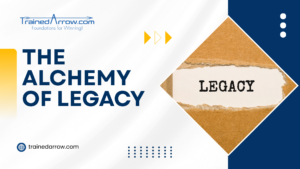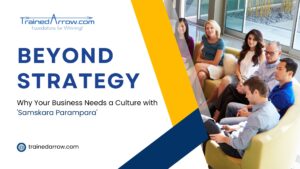
The Alchemy of Legacy … the soul-print we can leave in a fast-moving world!
In earlier times, life was simple. The past used to be with us. Families passed down not just names, but stories, values, and wisdom. The
![]()
There was an article in New York Times not long ago where they made reference to the world’s famous business leaders, successful CEOs, and the types of books contained on their bookshelves. What were they reading – Classics, management, leadership, biographies, or for therapeutic reasons, novels?
Steve Jobs was one of the profiles. Most imagined he was an avid reader of books on technology, software, hardware, the cloud, etc. To the surprise of many, he didn’t read all of the management and programming stuff one would think he did. He read about the life and effective principles for living that helped him build one of the best inventions of our time.
Such leaders learn the fundamental truths they can apply to business for value creation, and designed to help them succeed in business and in life. Most of them invariably exhibit ambidextrous capabilities with extreme versatility – the broader the range of skills and knowledge, the more interconnectedness of ideas, the more the innovation, the more the success!
Well, the world always seems to admire such capabilities in leaders only when they have demonstrated unusual standards of achievements irrespective of their backgrounds and capabilities; never bothered if they were high school dropouts or Ivy League MBAs; whether they ever had the right kind of form as long as they had the content that produced results.
At the core, this ability to effortlessly switch from one mode of working to another is more useful than ever for any business. One task presupposes to be super-technical to understand the intricacies of a technology capability and the next hour to insight surrounding buying behaviors to leverage technology can satisfy the strategic intent. This versatility has indeed emerged as a core competence to sustain and drive growth amidst technology disruptions for every organization.
But why then are these rare but highly successful ambidextrous leaders and versatile professionals in day-to-day lives denied opportunities to add value and make a difference? Why do most companies consider only those so-called ‘focused’ individuals? Do most organizations also suffer from ‘fear of failure’ as a consequence of NOT hiring? Is the answer to hire someone from a previous industry or held a similar role for many years as a guaranteed path to a successful selection? This not only questions the definition of ‘focus’ but remains at the heart of why businesses continue to seek but often fail at securing operational leadership that can bring a blueprint for success.
Consider this. Most Services businesses actually know that they need more than a salesman. They understand they are a combination of a salesman and a knowledge worker in order to sell, cross-sell, and up-sell. But then such demands are rarely reflected in their recruiting process, and job descriptions that end up being so stereotyped yet. To further diminish a positive outcome, HR and/or executive recruiters often take the requirement by the letter and not by the spirit – and refuse to consider such well-rounded, versatile, and ambidextrous candidates. I have also seen many businesses hire pigeon-holed Sales Executives who are known road warriors with inflated numbers and an outdated Rolodex. Too often a victory flag is raised when one of these “Hunters” is hijacked from a so-called competitor. I suppose the lack of loyalty to one company is no measure of loyalty to another.
How can organizations fix this? By identifying and labeling those key roles with e.g. “Ambidextrous role” “Versatile candidates most welcome”. This means that HR will understand the impact of such needs on their business much better. The organization will then be better positioned to redesign its recruiting process to accommodate a special effort to recruit such capabilities.
In April 2004, The Harvard Business Review published an article “The Ambidextrous Organization” by Charles O’Reilly and Michael Tushman. According to these gentlemen, organizations needed to be ambidextrous since success in business demanded such capability to deal with multiple changes and challenges of market dynamics.
Most companies are in dire need to revisit their current organizational structures and HR philosophy with an eye toward engaging (ambidextrous, all-rounder utility players) professionals with the full potential of dealing with challenges both for continuous improvements and innovations.
To acquire more of such professionals, organizations MUST redefine what is being considered ‘focus’, open up to welcoming versatility as strength as opposed to be obsessed with years spent in a functional role. This way, most ambidextrous professionals will not undersell themselves in pigeon-holed roles, pretend to be in suitable roles, and cease to feel handicapped!

In earlier times, life was simple. The past used to be with us. Families passed down not just names, but stories, values, and wisdom. The
![]()

Okay, listen up. We’re all chasing the next big tech flex and the fastest quarterly win. But what happens when the founder retires, or the
![]()

Can you? Read this short story: A senior leader who once worked closely with the Reliance Group of India shared this story with me –
![]()
We are passionate about people development and transformation. Our courses are designed for: College Graduates, Corporate Employees, and Entrepreneurs. Interested?
trainedarrow@samprad.net
+1-609-658-3053